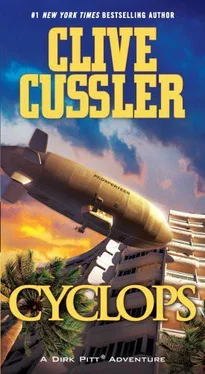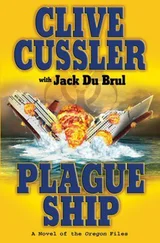The slight turbulence from the Dasher's passage through the water caused flecks of sparkling phosphorus that briefly flashed like an armada of fireflies before dying in his wake. Pitt was finally beginning to relax a bit when Kleist's voice came through his ear again "I put you about two hundred yards from shore."
Pitt slowed his little boat and eased ahead cautiously. Then he stopped, drifting with the current. He waited, eyes strained against the dark, tense and listening. Five minutes went by, and Cayo Santa Maria's outline vaguely loomed ahead, black and ominous. The surf was nearly nonexistent on the inside waters of the island, and its soft lapping on the beach was the only sound he could hear.
He gently pressed the power pedal and went forward dead slow, ready to turn hard and speed out to sea if they were detected. Seconds later, the Dasher bumped noiselessly into the sand. Immediately Pitt stepped out and dragged the light craft across the beach and into the underbrush beneath a line of palm trees. Then he waited until Quintana and his men rose up like wraiths and silently grouped around him in a tight knot, indistinct blurs in the gloom, thankful to a man their feet were on solid land again.
As insurance against Murphy's law, Quintana took precious time to account for every man and briefly check his equipment. Finally satisfied, he turned to Pitt. "After you, amigo."
Pitt took a reading from the compass, and then led the way inland on a slight angle to his left. He held the baseball bat out in front of him like a blind man with a cane. Less than two hundred feet from the staging area, the end of the bat met with the electrified fence. He stopped abruptly and the man in his rear bumped into him.
"Easy!" Pitt hissed. "Pass it on, we're at the fence."
Two men with shovels came forward and attacked the soft sand. In no time they had excavated a hole that was large enough to push a small burro through.
Pitt crawled under first. For a moment he was uncertain which way he should go. He hesitated, sniffing at the wind. Then, suddenly, he knew exactly where he was.
"We screwed up," he murmured to Quintana. "The compound is only a few hundred yards to our left. The antenna is a good mile in the opposite direction."
"How can you tell?"
"Use your nose. You can smell exhaust fumes from the diesel engines that run the generators."
Quintana inhaled deeply. "You're right. A breeze is carrying it from the northwest."
"So much for a quick solution. It'll take your men a good half hour to reach the antenna and set the charges."
"Then we'll go for the compound."
"Safer to play both ends against the middle. Send your strongest runners to blow the antenna and the rest of us will try for the electronics center."
Quintana took less than a second to make up his mind. He went through the ranks and quickly selected five men. He returned with a small, indistinct figure whose head hardly reached Pitt's shoulders.
"This is Sergeant Lopez. He'll need directions to the antenna."
Pitt stripped the compass off his wrist and handed it to the sergeant. Lopez didn't speak English and Quintana had to translate. The little sergeant was a quick study. He repeated Pitt's instructions flawlessly in Spanish. Then Lopez flashed a smile, gave a curt order to his men, and vanished into the night.
Pitt and the rest of Quintana's force took off at a run. The weather began to deteriorate. Clouds blanketed the stars, and the raindrops that splattered against the palm fronds made a strange drumming sound. They wound through trees gracefully curved from the fury of hurricane winds. Every few yards someone stumbled and fell but was helped up by others. Soon their breathing came more heavily and the sweat flowed down their bodies and soaked their battle fatigues. Pitt set a fast pace, driven on by desperate anticipation of finding Jessie, Giordino, and Gunn still alive. His mind remained remote from the discomfort and growing exhaustion by envisioning the agonies Foss Gly must have inflicted on them. His ugly thoughts were interrupted when he stepped out of the underbrush onto the road.
He turned left toward the compound, making no attempt at stealth or concealment, using the flat surface to make time. The feel of the land felt more familiar to Pitt now. He slowed to a walk and whispered for Quintana. When he felt a hand on one shoulder, he gestured at a dim light barely visible through the trees. "The guardhouse at the gate."
Quintana slapped Pitt's back in acknowledgment and gave instructions in Spanish to the next man in line, who slipped away toward the light.
Pitt didn't have to ask. He knew the security guards manning the gate had only another two minutes to live.
He skirted the wall and crept into the culvert, vastly relieved to find the bars still bent as he had left them. They scrambled through and wormed their way to the air vent above the compound's motor pool. This was as far as Pitt was supposed to go. Kleist's firm instructions were for him to guide Quintana's force to the air vent and go no further. He was to step out of the way, return alone to the landing beach, and wait for the others to withdraw.
Kleist should have guessed that when Pitt offered no argument the orders were not about to be carried out, but the colonel had too many problems on his mind to become suspicious. And good old Pitt, quite naturally, had been the very model of cooperation when he laid out a diagram of the entry into the compound.
Before Quintana could reach out and stop him, Pitt dropped through the vent onto the support girder over the parked vehicles and disappeared like a shadow down the exit shaft to the cells far below.
<<54>>
Dave Jurgens, flight commander of the Gettysburg, was mildly disturbed. He shared the elation with everyone in the space station at the unexpected arrival of Steinmetz and his men from the moon. And he found nothing amiss in the sudden orders to carry the colonists to earth as soon as their scientific cargo could be loaded into the shuttle's payload bay.
What disturbed him was the abrupt demand by Houston Control to make a night landing at Cape Canaveral. His request to wait a few hours until the sun rose was met with a cold refusal. He was given no reason why NASA officials had suddenly reversed their strict policy of daylight touchdowns for the first time in nearly thirty years.
He looked over at his copilot, Carl Burkhart, a twenty-year veteran of the space program. "We won't have much of a view of the Florida swamps on this approach."
"You see one alligator, you've seen them all," the laconic Burkhart replied.
"Our passengers all tucked in?"
"Like corn in a bin."
"Computers programmed for reentry?"
"Set and ticking."
Jurgens briefly scanned the three TV screens in the center of the main panel. One gave the status on all the mechanical systems, while the other two gave data on trajectory and guidance control. He and Burkhart began to run through the de-orbit and entry procedure checklist.
"Ready when you are, Houston."
"Okay, Don," replied ground control. "You are go for de-orbit burn."
"Out of sight, out of mind," said Jurgens. "Is that it?"
"We don't read, come again."
"When I left earth, my name was Dave.'
"Sorry about that, Dave."
"Who's on the line?" asked Jurgens, his curiosity aroused.
"Merv Foley. You don't recognize my resonant vowel sounds?"
"After all our scintillating conversations, you've forgotten my name. For shame."
"A slip of the tongue," said the familiar voice of Foley. "Shall we cut the small talk and get back to procedures."
"Whatever you say, Houston." Jurgens briefly pressed his intercom switch. "Ready to head home, Mr. Steinmetz?"
"We're all looking forward to the trip," Steinmetz answered.
Читать дальше












